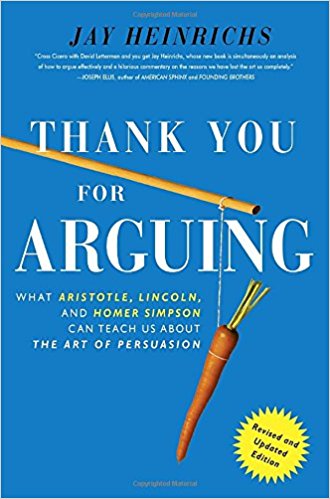Thank You for Arguing Summary
4 min read ⌚
 What Aristotle, Lincoln, and Homer Simpson Can Teach Us About the Art of Persuasion
What Aristotle, Lincoln, and Homer Simpson Can Teach Us About the Art of Persuasion
Aristotle, Lincoln, Homer Simpson… a curious bunch! But, Jay Heinrichs says that you can learn a lot about the art of winning an argument from each of them. What else is there left to say, but: “Thank You for Arguing.”
About Jay Heinrichs
 Jay Heinrichs is an American author, one of the leading theoreticians on topics such as persuasion and conflict. He is the founding editor of few magazines and a Professor of the Practice in Rhetoric and Oratory at Middlebury College.
Jay Heinrichs is an American author, one of the leading theoreticians on topics such as persuasion and conflict. He is the founding editor of few magazines and a Professor of the Practice in Rhetoric and Oratory at Middlebury College.
He has written few other similar books, including “How to Argue with a Cat” and “Word Hero.”
“Thank You for Arguing Summary”
Nowadays, we tend to think of arguments as heated disagreements we should avoid at all costs.
But, if you think about it, the word “argument” itself has many meanings, one of which is basically “a debate” (as in: “philosophical arguments”) and the other “a course of reasoning aimed at demonstrating truth or falsehood” (as in: “she presented a strong argument.”
In other words, “arguing” doesn’t only mean “quarrelling,” but also “making a case, exploring, claiming.” We need less arguments of the first kind; many, many more of the second, dying kind.
A good example of this are marriages. According to a study by psychologist John Gottman, both divorced and happily married couples argue. The difference is that the latter use arguments to reach some kind of consensus!
That was the way all of Ancient Greece functioned. And that is the way you should start functioning too.
And the first lesson: always have some goal in mind before starting an argument! Afterward, work toward that goal with every part of your body and reason. Because, humans are predictably irrational. Or, in other words: logic and arguments in themselves won’t work.
Seduction will. Says none other than Aristotle.
A quick throwback: John Kerry won all the debates against George W. Bush. Yet, the later one won the presidential race.
Why?
Because, he seduced the population by giving them what they wanted in the first place; or convincing them that they wanted what he was about to offer.
And he used the very basic tools of persuasion, as illustrated by Aristotle in his “Rhetoric”: logos, pathos, and ethos.
Logos is all about logic. It’s about using the best rational techniques to persuade your audience. It’s not only about having the arguments at your side – it’s about using the ones you have at the very right moments.
Pathos is the emotional element. This one’s all about recognizing your audience’s feelings and aligning with them. Or, even worse: toying with them. Politicians promise things they know they can’t deliver upon. They don’t care: the goal is simply to win over the emotions of the voters.
Finally, ethos is all about character. And, strangely enough, Aristotle considered it the most important element of winning an argument.
Why?
Because, people believe more those who not only talk the talk but have walked the walk as well. That’s exactly why you can’t win an argument about war against a veteran!
Key Lessons from “Thank You for Arguing”
1. Persuasion Is an Ancient Greek Art of Three Tools
2. In an Argument, What You Say Means Less Than Who You Are
3. Detect Bad Examples and Tautologies and Win the Audience
Persuasion Is an Ancient Greek Art of Three Tools
Persuasion is an Ancient Greek art. In fact, one of the very first books on rhetoric is as influential today as it was when first written about two and a half millennia ago.
After all, its author was Aristotle.
And in his opinion, you can persuade someone using one of three tools. The first one is logos, or the authority of reason and arguments. The second one is pathos – or the power of emotions. And, finally, the third one is ethos – or the integrity of character.
In an Argument, What You Say Means Less Than Who You Are
Aristotle considered the last one – ethos, character – the most important tool of influencing people. In his opinion, having the arguments and sympathizing with your audience will eventually come to nothing – if you don’t point out your strengths to it, and use your opponent’s weaknesses.
Charismatic leaders are nothing else but people who have convinced other people they can trust them. Take Abraham Lincoln for example. He was against slavery – and the majority of people in his days were for it. But, it didn’t matter in the end; because people simply liked Lincoln.
Detect Bad Examples and Tautologies and Win the Audience
“Thank You for Arguing” is a great compendium of relevant examples – ranging from anecdotes to pop culture references – and great advices. One of the best: detect bad examples and tautologies, because people use them on a daily basis and look perplexed and stumped when someone points them out to them.
An example of a bad example: a mother concluding that her kids aren’t safe outside because she has just heard a story about the murder of a child. (Yes – that leads to helicopter parenting).
An example of tautology: “It’s no exaggeration to say the undecideds could go one way or another.” George Bush said that.
Like this summary? We’d like to invite you to download our free 12 min app, for more amazing summaries and audiobooks.
“Thank You for Arguing” Quotes
Rhetoric is the art of influence, friendship, and eloquence, of ready wit and irrefutable logic. And it harnesses the most powerful of social forces, argument. Share on X When you want to change someone’s mood, tell a story. Share on X It’s a form of amplification, an essential rhetorical tactic that turns up the volume as you speak. In a presentation, you can amplify by layering your points: ‘Not only do we have this, but we also…’ Share on X Extremists usually describe the middle course as extreme. Share on X The person who lived an entirely private life, Aristotle said, was either a beast or a god. Share on X
Emir is the Head of Marketing at 12min. In his spare time, he loves to meditate and play soccer.


 What Aristotle, Lincoln, and Homer Simpson Can Teach Us About the Art of Persuasion
What Aristotle, Lincoln, and Homer Simpson Can Teach Us About the Art of Persuasion



